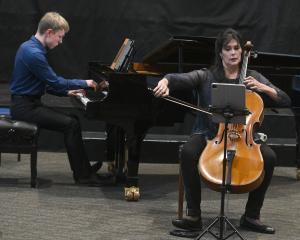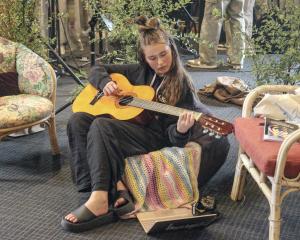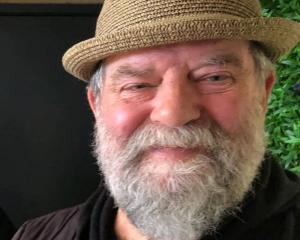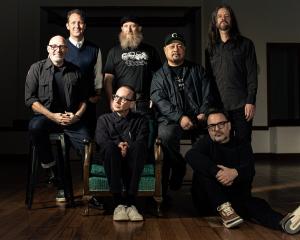In other words, it is highly experimental.
It is also, in no particular order, confrontational, noisy, ambitious and technically difficult.
Osborne is discussing his band's 26-year career via telephone from California. It's the day before the last of four Friday-night gigs at Los Angeles venue Spaceland, after which The Melvins head to Australia and New Zealand for a series of shows that includes a gig at Dunedin's Refuel venue on Sunday, February 20.
Although he formed the band in Washington state in the early 1980s, Osborne has lived in Los Angeles for almost 18 years, managing to avoid the hype and gloss of the corporate music world by burying his head in the complex details of The Melvins' music.
"I believe I have good taste and that if I like something then other people will like it. I've never concerned myself with whether our audience could handle what we are doing; I always just figured they could," Osborne says when asked to explain his longevity in a fickle industry.
"I set out to make things as interesting as possible. I have a wide variety of interests, a wide variety of influences. We could talk about influences all day long.
"I don't have any ideas that we're going to be on TV or selling millions of records - it's not going to happen ... If the world was the right place we should sell millions of records. But there is a difference between what 'should' and what 'will' happen.
"Our product, what we put out, is something we consider to be A1. Whether the rest of the world thinks that is anybody's guess."
The Melvins might not be a household name, but the group has influenced a range of other acts, including Seattle-based grunge legends Soundgarden and Nirvana. (Nirvana frontman Kurt Cobain, who once auditioned for The Melvins on bass but missed out, produced and played on some songs on The Melvins' major label debut, Houdini. Tool member and eminent heavy rock guitarist Adam Jones has also joined the group on several occasions.)
The band released five albums on independent labels before it signed with Atlantic Records in 1993 (Atlantic released three Melvins records before ending its contract); subsequently, it has been with Ipecac Records.
Its latest album, The Bride Screamed Murder, sneaked into the Billboard Top 200 in June last year (at No 200), Osborne describing the feat at the time as "an overnight success if you take away the previous 25 years, the months of rehearsals, the endless hours of songwriting".
Significantly, the frizzy-haired frontman says, The Melvins' inclusion reveals the parlous state of record sales in the United States.
"We made the American Top 200 by only selling 3000 records. Fifteen years ago when we were on Atlantic Records, we used to give away 3000 records. We sold far more records on Atlantic and never came close to denting the Billboard Top 200.
"To me, that stuff is all balls ... The Top 200 in America is only if your record is less than three years old. I'm sure there are classic records by Pink Floyd that sell way more than what is in the top 200; they just don't include them."
Though Osborne and drummer-vocalist Dale Crover have seen fellow members come and go over the years, they have enjoyed a relatively stable line-up since merging with the band Big Business in 2006, a move that heralded the arrival of a second drummer, Coady Willis (as well as bassist Jared Warren) and allowed The Melvins to continue an ethos of "more is more".
That is no more evident than in The Bride Screamed Murder, an eclectic album that opens with the drum-heavy The Water Glass and Evil New War God and closes with a sludgy, distorted seven and a-half minute cover of The Who's My Generation and an a cappella Canadian folk song. Eclectic? You bet.
"You know, I've written and recorded well over a hundred songs. There is no one way to do things," Osborne says. "I'm either very relaxed about those sorts of things or wandering about in various states of high anxiety; there is not a lot of in between. Either it comes naturally or it's the most unnatural thing in the world.
"Sometimes the easy stuff is the best stuff; sometimes you have to fight your way upstream, in a river of s ... and it ends up being good. There is no road map. I wish there was. It'd be a lot easier on me, I tell ya.
"Our music is a challenge to play. If people don't think it is, they can give it a shot. It's not easy; you have to be 'on it'. There is a lot of odd stuff going on. Most people won't notice how difficult it is; they never do. It has always been that way. Our drummer, Coady, says that if you do something right nobody notices you've done anything at all. I think that's true."
That technical ability has largely been honed on the road. The Melvins are, primarily, a touring band, says Osborne.
"We need to play live in order to survive as a band and that's fine by me because I've always thought that was something we excelled at. We grew up playing all sorts of venues. I'm not really a fan of the big-arena rock things. We are doing a festival tour in Australia but we don't really get offered those things very often. By and large, I'm more interested in venues that are between 250 and 1200 people."
It has been a while since Osborne last visited Dunedin, yet he remembers the visit clearly.
"We headlined a tour in 1997. On our off day, we went to a theatre and saw [Alfred Hitchcock's] Vertigo. I don't know what was going on; there was nobody there apart from us and about five other people. We were like, 'wow, it's playing at noon' ... we were very excited."
• See them
The Melvins perform at Refuel, Dunedin, on Sunday, February 20.












